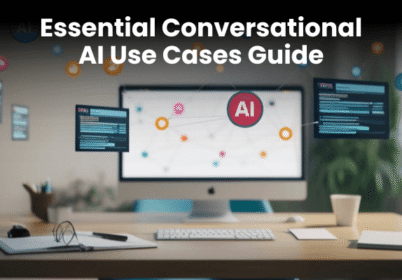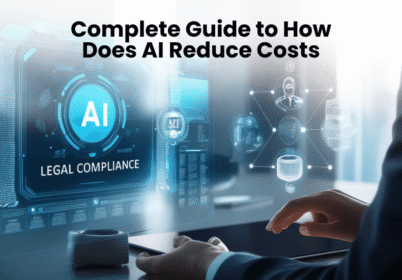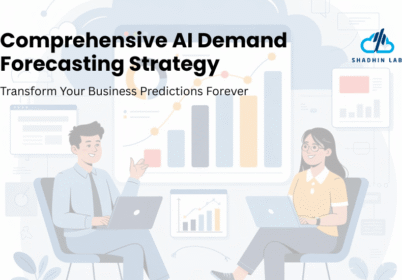Best Claude AI Alternatives in 2025: Top Competitors Compared

Table of Contents
The landscape of conversational AI has transformed remarkably throughout 2025, with advanced language models now handling increasingly complex tasks with impressive capabilities. If you have been exploring AI tools, you have likely noticed how organizations across industries actively seek specialized artificial intelligence assistants that match their specific requirements and operational needs. Claude, developed by Anthropic, has established itself as a thoughtful AI assistant widely recognized for safety features and superior reasoning abilities.
Claude’s approach to responsible AI has garnered significant attention from enterprise users and individuals seeking reliable assistance. If you are considering options, you might also wonder whether Claude is the right fit for you or if exploring alternatives makes more sense. Many users explore other AI assistants for reasons such as pricing, unique features, or specific use cases. This growing demand reflects how diverse organizational needs often require different AI solutions, and understanding those options can help you make smarter choices.
Key Takeaways
- Readers will get to know how Claude AI works, its strengths, and the best alternatives available in 2025.
- Understand Claude AI’s unique approach with its focus on safety, reasoning, and long-context document processing.
- Explore top alternatives like ChatGPT, Gemini, Llama 3, Perplexity, and Mistral, each excelling in different areas.
- Compare models based on pricing, subscription tiers, free access limitations, and enterprise-level cost structures.
- Evaluate integration options, deployment flexibility, and data security features for organizational needs.
- Decide the right AI assistant by balancing creativity, reasoning, compliance, and performance for specific use cases.
Table of Contents
What is Claude?
Claude is an AI assistant created by Anthropic, a company founded by former OpenAI researchers with deep expertise in language model development. The system represents a focused effort toward building safer, more responsible artificial intelligence technology that prioritizes beneficial human interactions. Claude differentiates itself through its Constitutional AI approach, which guides responses toward helpful, harmless, and honest communication patterns.
Anthropics designed Claude to be particularly thoughtful in its responses while maintaining natural conversational abilities across diverse topics. The system excels at understanding nuanced prompts and generating coherent, contextually appropriate content even with complex instructions. Claude aims to minimize harmful outputs through extensive training on human feedback and sophisticated safety mechanisms.
The assistant positions itself as a more controlled alternative to other generative AI systems available in today’s market. Claude emphasizes ethical considerations and responsible use cases throughout its development philosophy and practical implementation. This careful approach has made it particularly attractive for enterprise customers with stringent safety requirements and compliance concerns.
Anthropics continues to refine Claude through iterative improvements and regular new model releases with enhanced capabilities. The company maintains a strong focus on alignment research to ensure AI systems remain beneficial as technical capabilities advance rapidly. This unwavering commitment to safety has become a defining characteristic of the Claude user experience.
Overview of Claude AI’s Models
Claude currently offers three primary models, each designed for different use cases and performance requirements:
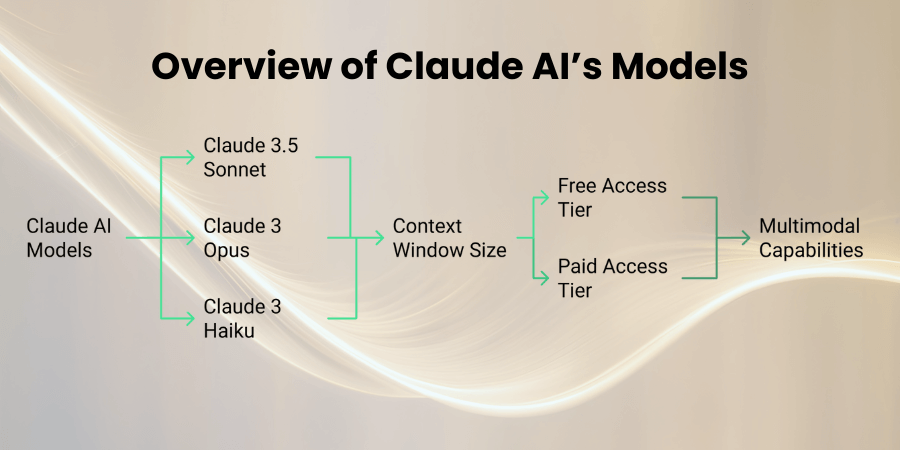
- Claude 3.5 Sonnet represents the most advanced version with exceptional reasoning capabilities and nuanced understanding of complex topics.
- Claude 3 Opus serves as the previous flagship model with strong performance across various domains and professional applications.
- Claude 3 Haiku provides a more streamlined experience optimized for speed and efficiency in straightforward tasks.
Each Claude model features different context window sizes, significantly affecting how much information they can process simultaneously. The largest models support up to 200,000 tokens, allowing for comprehensive analysis of extensive documents and lengthy conversations. This expanded context window represents a significant advantage for research projects and detailed document processing tasks.
Anthropics offers both free and paid access tiers across these models with varying capabilities and usage allowances. The free tier provides limited access with reasonable restrictions on usage frequency and advanced features. Premium subscriptions unlock the full capabilities with substantially higher usage limits and priority processing for time-sensitive applications.
The models differ noticeably in their multimodal capabilities, with newer versions handling both text and image inputs effectively. This versatility allows users to share visual information alongside textual prompts for more comprehensive and natural interactions. The multimodal functionality continues to improve significantly with each model iteration and system update.
What Is Claude Best For?
Claude excels at processing and analyzing long-form content with remarkable comprehension abilities that maintain context throughout. The extensive context window allows users to input entire documents, research papers, or lengthy conversations for thorough analysis. This capability makes Claude particularly valuable for research synthesis and comprehensive document analysis tasks requiring deep understanding.
Corporate and enterprise environments benefit greatly from Claude’s careful approach to handling potentially sensitive information. The system maintains appropriate boundaries when processing confidential data or responding to potentially problematic requests. Many organizations appreciate this balanced approach to information security and ethical considerations in daily operations.
Complex reasoning tasks represent another area where Claude demonstrates exceptional performance compared to many alternatives. The system can follow multi-step instructions, solve logical problems, and maintain coherence across extended exchanges with minimal confusion. This advanced reasoning capability proves especially valuable for decision support and analytical applications requiring nuanced thinking.
Content creation with depth and subtlety remains a core strength of Claude’s capabilities across various professional contexts. The system generates well-structured, thoughtful writing across numerous formats and styles with appropriate tone adjustments. Many users rely on Claude for drafting articles, reports, and creative content with minimal factual errors or logical inconsistencies.
Educational applications benefit substantially from Claude’s ability to explain complex concepts clearly and accurately at various levels. The system adapts explanations effectively to different knowledge levels and learning styles without oversimplification. Students and educators increasingly utilize Claude for tutoring assistance, research guidance, and supplemental learning support across disciplines.
Claude demonstrates particular strength in code understanding and explanation tasks despite not being primarily designed as a coding assistant. The system provides valuable insights into programming concepts and helps clarify technical implementations. Many developers use Claude to understand unfamiliar codebases or explain technical concepts to non-technical team members.
Best Claude AI Alternatives
1. ChatGPT (OpenAI)
ChatGPT represents the most prominent alternative with widespread adoption across numerous industries and applications. OpenAI’s flagship assistant offers strong performance in creative writing, coding assistance, and general knowledge tasks with impressive versatility. The system provides excellent flexibility for both casual personal use and demanding professional applications.

GPT-4o powers the latest version with advanced multimodal capabilities and significantly improved reasoning over previous iterations. This model processes both text and images with impressive understanding of visual content and contextual relationships. Many users prefer ChatGPT specifically for creative applications and comprehensive programming assistance across languages.
OpenAI provides both free and premium access tiers with substantially different capabilities and usage limitations. The free version offers good performance for basic tasks while premium subscriptions unlock advanced features and models. ChatGPT’s extensive plugin ecosystem enables seamless integration with numerous external tools and services for enhanced functionality.
2. Gemini (Google)
Google’s Gemini models offer robust performance with particularly strong multimodal capabilities and real-time information access. The system excels at tasks involving both textual and visual information processing with minimal confusion. Gemini demonstrates exceptional performance in scientific reasoning and mathematical problem-solving compared to many competitors.

The integration with Google’s broader ecosystem provides unique advantages for research and comprehensive information retrieval. Gemini connects seamlessly with Google Search and other productivity tools for enhanced functionality. Many users choose Gemini specifically for its real-time information access and consistently high factual accuracy.
Google offers Gemini across multiple tiers including free access and premium subscriptions with different capabilities. The Advanced tier unlocks the most capable model with extended context windows and priority processing. Gemini works particularly well for academic research and technical documentation tasks requiring current information.
3. Llama 3 (Meta)
Meta’s Llama 3 represents an open-source alternative with impressive capabilities and unmatched deployment flexibility for technical teams. The model comes in various sizes allowing for customization based on specific resource constraints. Many organizations choose Llama for self-hosted applications requiring strict data privacy and complete infrastructure control.
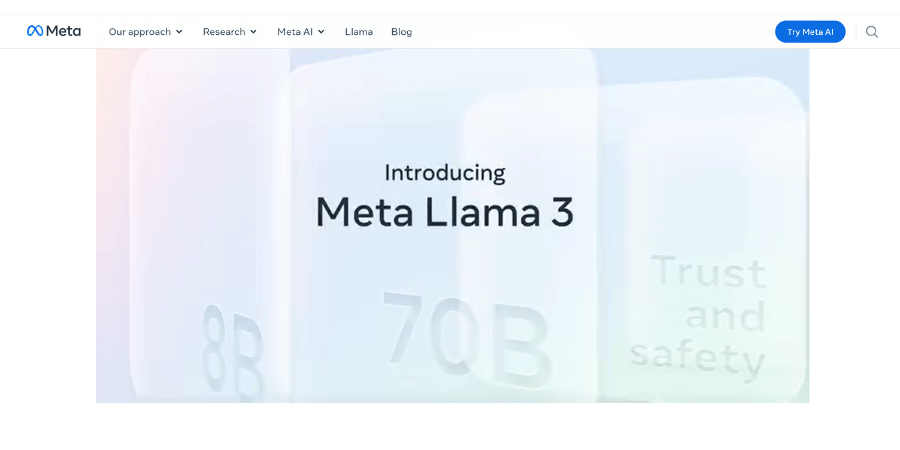
The open nature of Llama enables extensive fine-tuning for specialized applications and domain-specific requirements. Developers can adapt the model for highly targeted tasks with custom training and optimization. This flexibility makes Llama particularly valuable for technical teams with specific requirements and customization needs.
Llama models demonstrate strong performance in multiple languages and technical domains without requiring constant connections. The system handles coding tasks and multilingual content effectively across diverse applications and use cases. Organizations often deploy Llama when control over infrastructure and data handling remains absolutely paramount.
4. Perplexity AI
Perplexity AI differentiates itself through real-time information retrieval and comprehensive citation capabilities for factual queries. The system combines language model capabilities with active web searching functionality for current information. This innovative approach ensures up-to-date information with verifiable sources for research and fact-checking needs.
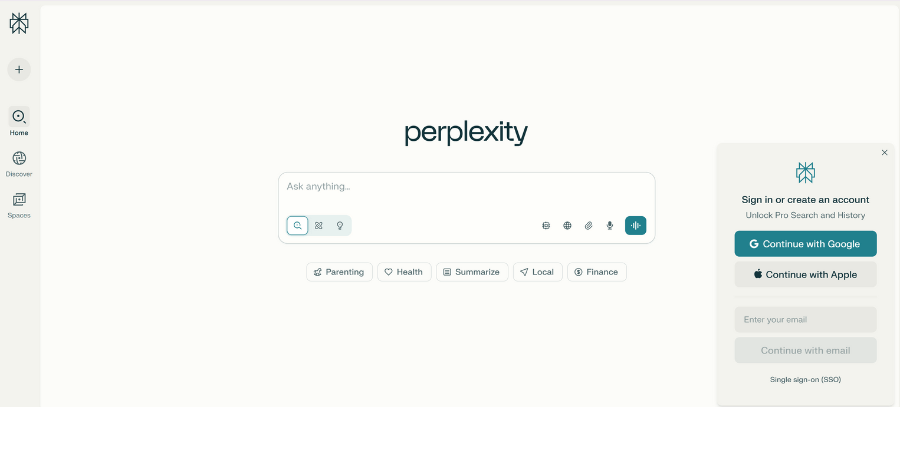
The focus on attribution and sources makes Perplexity especially valuable for research and professional fact-checking applications. Users receive detailed responses with direct links to original information sources for verification. Many professionals choose Perplexity specifically for tasks requiring current information with proper citation and source transparency.
Perplexity offers both conversational interfaces and more structured research experiences depending on user needs. The system organizes information clearly with supporting evidence for claims and factual statements. Academic researchers and journalistic users particularly value this strong emphasis on information provenance and verification.
5. Mistral AI
Mistral AI provides remarkably efficient models with impressive performance-to-size ratios for various applications. The company focuses on creating compact yet capable language models that minimize resource requirements. Their thoughtful approach enables deployment in resource-constrained environments while maintaining high response quality.
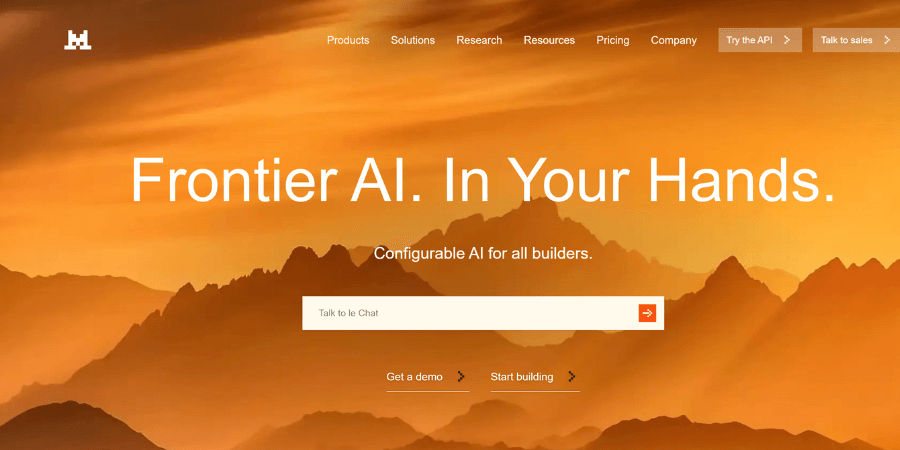
The Mistral ecosystem includes models of various sizes for different applications and computational constraints. Users can select appropriate models based on specific requirements and available resources. Many developers appreciate Mistral’s transparent approach to clearly communicating model capabilities and potential limitations.
Mistral offers both hosted services and downloadable models for self-deployment according to preference. This flexibility supports various implementation scenarios across different organizational structures and requirements. Technical teams often select Mistral for specialized applications requiring customization and complete deployment control.
| Alternative | Key Strengths | Best Use Cases | Pricing Model |
| ChatGPT | Creative writing, coding, plugin ecosystem | Content creation, programming assistance, general knowledge | Free tier + Premium subscription ($20/month) |
| Gemini | Multimodal capabilities, scientific reasoning, Google integration | Research, mathematical problems, real-time information | Free tier + Premium subscription ($19.99/month) |
| Llama 3 | Open-source, customizable, self-hosting options | Self-hosted applications, specialized domain adaptation, privacy-focused deployments | Free (open-source) with self-hosting costs |
| Perplexity | Real-time information, source citations, factual accuracy | Research, fact-checking, current events analysis | Free tier + Pro subscription ($19.99/month) |
| Mistral | Efficient models, transparent capabilities, deployment flexibility | Resource-constrained environments, specialized applications, edge deployment | Various tiers including free API access |
Key Aspects to Consider When Choosing a Claude Alternative
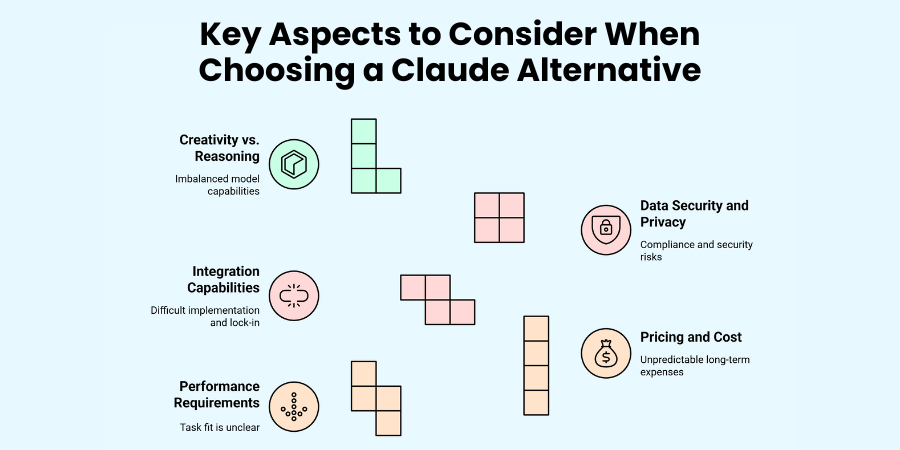
Performance Requirements
When evaluating Claude alternatives, consider these key performance factors for your specific needs:
- Task complexity and whether your workflows involve simple queries or multi-step reasoning processes
- Response quality consistency across different types of requests and subject matter areas
- Multimodal requirements for processing images, charts, or other visual content effectively
- Domain-specific performance in specialized areas like creative writing, coding, or analytical reasoning
Different models excel in specific domains despite general-purpose marketing claims about universal capabilities. Testing multiple alternatives with truly representative tasks offers valuable performance insights beyond specifications. Your actual workflows provide the most relevant benchmark for meaningful comparison between options.
Pricing and Cost Structure
Subscription models differ significantly across Claude alternatives with important implications for regular users and teams. Monthly subscription costs range from free options to premium tiers exceeding $20 per month. Consider your typical usage patterns carefully when evaluating the long-term cost-effectiveness of different pricing structures.
Usage-based pricing models charge according to tokens processed or API calls made rather than flat fees. This consumption approach may prove more economical for intermittent or highly specialized usage patterns. Organizations should forecast approximate usage volumes when comparing consumption-based alternatives to subscription models.
Free tier limitations vary dramatically across different Claude alternatives with significant practical implications. Some providers offer genuinely useful free access with reasonable capabilities and generous limits. Others provide severely restricted functionality that proves inadequate for serious applications requiring reliability.
Enterprise pricing typically involves custom quotes based on volume requirements and specific feature needs. Large organizations should engage directly with providers to negotiate appropriate terms for their scale. Volume discounts and specialized support options often become available exclusively at enterprise scales.
Integration Capabilities
API availability and documentation quality significantly impact implementation success for technical teams and developers. Evaluate whether alternatives provide comprehensive, well-documented interfaces for custom integration projects. Developer experience varies considerably across different Claude alternatives with practical implications.
Pre-built integrations with common productivity tools save substantial development effort and implementation time. Check whether alternatives connect directly with your existing software ecosystem and workflows. Many providers offer convenient plugins for platforms like Slack, Microsoft Teams, or content management systems.
Custom deployment options matter significantly for organizations with specific infrastructure requirements or constraints. Some alternatives support on-premises installation or private cloud deployment for controlled environments. These specialized options typically involve additional costs but address specific security or compliance needs.
Data portability considerations affect long-term flexibility when potentially switching between providers in the future. Assess whether user data and conversation history can be exported easily in standard formats. Vendor lock-in risks increase substantially when data migration paths remain limited or proprietary.
Data Security and Privacy
Data handling policies differ substantially across Claude alternatives with important compliance implications for sensitive information. Review whether providers store conversations, use data for model training, or share information with partners. Privacy-sensitive applications require careful evaluation of data retention practices and processing locations.
Compliance certifications provide formal validation of security practices and privacy protections for regulated industries. Check whether alternatives maintain SOC 2, HIPAA, GDPR, or other relevant certifications for your requirements. Regulated industries often require specific compliance documentation for technology adoption and ongoing use.
Regional data storage options address data sovereignty requirements in certain jurisdictions with strict regulations. Some alternatives offer geographic control over data processing and storage locations for compliance. Organizations with international operations should verify regional compliance capabilities across all operating locations.
On-premises deployment represents the strongest control over sensitive information for organizations with strict requirements. Certain alternatives support self-hosting while others remain exclusively cloud-based services without local options. Security teams should evaluate the risk profile appropriate for specific use cases and data sensitivity.
Creativity vs. Reasoning Balance
Different alternatives emphasize creative generation or analytical reasoning capabilities to varying degrees. Consider whether your applications require imaginative content creation or logical problem-solving approaches. The optimal balance between creativity and reasoning varies significantly based on specific use cases.
Creative writing performance varies considerably across different Claude alternatives with noticeable stylistic differences. Some excel at generating engaging narratives, marketing copy, or creative content with distinctive voice. Others produce more formulaic outputs that lack stylistic flexibility or originality in creative contexts.
Analytical reasoning capabilities determine performance on complex problem-solving tasks requiring logical thinking. Evaluate how alternatives handle multi-step logic, mathematical reasoning, or structured analysis of information. Technical and analytical applications typically require strong reasoning foundations rather than creative flair.
Hallucination tendencies represent an important consideration for factual applications requiring absolute accuracy. Some alternatives generate plausible-sounding but incorrect information more frequently than others in certain domains. Critical applications require models with stronger factual grounding and significantly lower hallucination rates.
Conclusion
Claude has established itself as a thoughtful AI assistant with strengths in safety, reasoning, and comprehensive document processing. Its constitutional approach and extensive context window provide unique advantages, though viable alternatives exist for different needs and use cases.
The ideal choice depends on your requirements and environment. ChatGPT offers creative capabilities and strong integrations, Gemini provides multimodal performance, and Llama enables customization and privacy-focused deployments. Many organizations benefit from using multiple AI assistants, leveraging the strengths of each for specific tasks. The conversational AI ecosystem will continue evolving rapidly. The most successful implementations match tools thoughtfully to use cases rather than forcing standardization.
Frequently Asked Questions
What is the main difference between Claude and ChatGPT?
Claude emphasizes safety and reasoning with extensive document processing capabilities through its constitutional AI approach. ChatGPT offers stronger creative capabilities, coding assistance, and a robust plugin ecosystem for extended functionality. Claude handles longer contexts effectively while ChatGPT provides more third-party integration options for workflow enhancement.
Are there any free Claude alternatives available?
Several free Claude alternatives exist with varying capabilities and practical limitations for different needs. ChatGPT offers a capable free tier with reasonable performance for many basic tasks. Gemini provides free access with convenient Google account integration for personal use. Open-source options like Llama allow self-hosting without licensing fees for technical organizations.
Which Claude alternative works best for coding tasks?
ChatGPT currently leads among Claude alternatives for coding assistance with strong performance across multiple programming languages. The system handles code generation, debugging, and explanation tasks effectively for developers. GitHub Copilot, while more specialized, offers deeper code integration for professional development workflows requiring consistent assistance.
Can Claude alternatives process images like Claude?
Many leading Claude alternatives now offer multimodal capabilities for processing images alongside text in conversations. Gemini demonstrates particularly strong visual understanding capabilities across diverse image types and formats. ChatGPT with GPT-4o provides excellent image analysis and can discuss visual content comprehensively with natural understanding.
Ashikul Islam
Ashikul Islam is an experienced HR Generalist specializing in recruitment, employee lifecycle management, performance management, and employee engagement, with additional expertise in Marketing lead generation, Content Writing, Designing and SEO.
Related Post
Conversational AI Use Cases That Drive Revenue
Are you frequently considering how technology could revolutionize your business operations? Conversational AI use cases are...
How Does AI Reduce Costs? A Guide to Business Cost Optimization
Are you lying awake wondering how your business can survive rising operational costs? Have you watched...
How AI Improves Demand Forecasting Accuracy and Decision-Making
Are you tired of watching your inventory costs spiral out of control while customers walk away...

